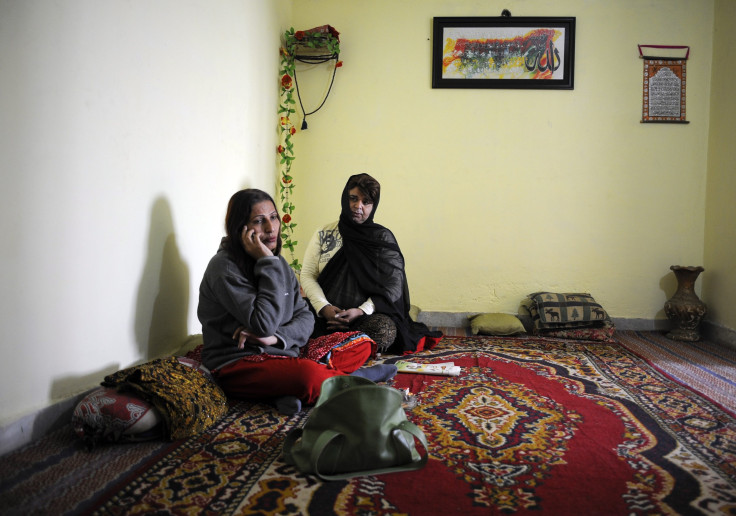The Third Sex: Transgenders, Eunuchs To Run For Political Office in Pakistan

Pakistan might be the last country on Earth where one would find a gay or transgender person running for political office. But that is precisely what has happened, almost two years after the nation’s Supreme Court ordered the state to register the community as voters, issue them identity cards and guarantee them the same civil rights as other citizens.
Numbering some 500,000, the “hijra” (which roughly translates into “eunuch”) are now also eligible to run as political candidates in upcoming parliamentary and provincial elections in May, according to Agence France Presse.
Traditionally, the hijra (who are also numerous in India) have begged, sung or danced at weddings or worked as prostitutes to earn income. They have suffered enormous abuse and discrimination -- not surprising, given that homosexuality is considered a grave sin and is, in fact, illegal in Pakistan.
The term “hijra” may also apply to hermaphrodites, transsexuals, transvestites and castrated men.
In India, hijras also are known to appear outside of peoples’ homes when an infant son is born to a family, singing, dancing and always demanding money before they leave.
"It is not our destiny to merely dance for others and hold begging bowls. We have a life to live," a Pakistani hijra named Sanam Fakir, who is planning to run for local office in Sindh province, told AFP from the town of Sukkur.
However, given the deeply entrenched patronage system in Pakistani politics and the overwhelming advantages held by the wealthy landowning class, people like Fakir have little hope of actually gaining seats in her provincial assembly.
"We are not corrupt. We have no need to be corrupt. We have no families, and our own needs are limited. We are contented people. I know it is very difficult to defeat [powerful established politicians], but everyone should contribute for the betterment of society," Fakir said. "We are getting educated now. People used to make fun of us, but now they have started to respect us.”
Hijras trace their history in South Asia at least back to the 16th century, when they served as guards and entertainment for the courts of the Mogul princes and kings who ruled present-day India, Pakistan and Afghanistan.
They have survived on the fringes of society ever since, sometimes lauded for their entrainment value and even good looks, but largely despised for what is viewed as their sexual perversion.
Rabail Baig, a Pakistani journalist, commented in Foreign Policy magazine that being a minority in Pakistan is difficult, but being sexual minority is far worse.
“In a Muslim society, where patriarchal orientation reigns supreme and we are constantly battling gender discrimination, the transgendered obviously have little or no space in the social setup of things,” she wrote.
“For the past six decades, hijras in Pakistan have been isolated and denied any form of identity, along with basic human rights such as education, employment and health care. Disowned by their families and mocked and ridiculed by the rest, hijras find shelter among their kind under gurus -- leaders of small, scattered transgender communities -- who give them food and wage in return for their service and contribution to the group. With not many open doors in sight, they beg, dance and engage in prostitution as their only means of livelihood, becoming soft targets for harassment, violence, abuse and rape, mostly in the hands of the local police.”
"I'm neither a man nor a woman," a hijra named Mehvish in Rawalpindi lamented to National Public Radio. "We cannot marry; we cannot produce children. So this is how we lead our lives. We are neither."
In 2010, the Guardian newspaper of Britain reported on the hijra community in the Pakistani city of Rawalpindi, citing how the transgender class suffered from extortion, sexual assault and brutal policemen. However, the Supreme Court’s efforts to legitimize the hijras were welcomed.
"Times are changing," Almas Bobby, a hijra leader in Rawalpindi, said. "Our community feels good for the first time in 60 years."
The man who was instrumental in helping the plight of this most marginalized of communities was an attorney who specializes in Islamic law.
Muhammad Aslam Khaki, an Islamabad-based barrister, agitated for the Supreme Court to recognize the rights of hijras after reading about the robbery and brutal gang-rape of hijra wedding dancers by police in the town of Taxila.
"People don't consider them as human beings. They don't like to eat with them, drink with them or shake their hands," Khaki told the Guardian. "But they are full citizens of Pakistan like everyone else."
Not surprisingly, Khaki’s advocacy on behalf of the despised hijras has rubbed some the wrong way. He has received death threats from fundamentalist militants, including members of Shabab e-Milli, which is linked to Jamaat e-Islami, Pakistan’s principal religious party.
"They say I am protecting the gay culture. But I am protecting them from the police culture of torture and sex abuse,” Khaki added.
In countries like Pakistan and India, where anti-gay sentiments are so virulent, often backed by cultural and religious customs, homosexuality and other forms of “sexual deviancy” ironically flourish in the shadows of society. Compounding this mass of hypocrisy is that fact that young people grow up in sexually segregated environments -- a situation that frequently leads to homosexual encounters among sexually repressed people, particularly among young men.
"Homoeroticism you'll see, but that doesn't necessarily mean they'll have a same-sex relationship," Fatimah Ihsan, a gender studies professor in Pakistan, explained to NPR. "It's just part of our culture. In the West, I think [sexual categories have] been boxed so strictly."
© Copyright IBTimes 2024. All rights reserved.





















